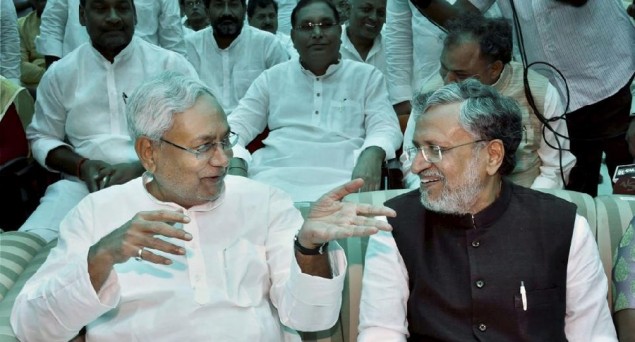The current law disqualifies legislators when they break away from their party with less than two-third of its legislators.
Ghazanfar Abbas, IndiaTomorrow.net,
New Delhi, Aug 26: Since Bihar Chief Minister Nitish Kumar broke away from the public-mandated pre-poll Grand Alliance or Mahagathbandhan in July and overnight formed a new government with BJP – the party he and the Grand Alliance had fiercely fought against and defeated in the 2015 Assembly polls – some political and social circles have had a debate whether the anti-defection law that regulates legislators’ political loyalty should be amended to cover political parties that break a pre-poll alliance. The current law disqualifies legislators when they break away from their party with less than two-third of its legislators.
In a conversation with IndiaTomorrow.net, some eminent academicians and civil rights activists said that in wake of the recent political development in Bihar, the anti-defection law should be amended because to break wining pre-poll alliance is a “betrayal” to the mandate given by the voters. They also said that Nitish Kumar should have sought a fresh election after he broke away from the pre-poll Grand Alliance.
“The Bihar mandate was clearly against the BJP and so it should not have been allowed to join the government in Bihar. Nitish Kumar should have resigned and sought fresh mandate from the people. It is the betrayal of pre-poll alliance and the Election Commission must work on some mechanism so this kind of thing can be prevented,” said Dr Sandeep Pandey, visiting faculty of IIT Gandhinagar.
Before the state Assembly elections were held in Bihar in 2015, Janata Dal United (JD-U) of Nitish Kumar, Rashtriya Janata Dal (RJD) of Lalu Prasad Yadav and Congress party had formed an alliance against BJP and fought the elections under the banner of Grand Alliance or Mahagathbandhan. RJD, JD-U and Congress won 80, 71 and 27 seats respectively.
According to a clause of the existing ant-defection law, it requires at least two-third members of a legislature party to form a new political group, or ‘merge’ with another political party, otherwise the member/s would lose the membership of the assembly/house.
Environmentalist Dr Soumya Dutta also put similar views advocating amendment in the anti-defection law.
Dr Dutta said, “People choose a party based on its manifesto and promises. So, after winning the election the particular party is committed to implement the manifesto. But if the party changes its stand, it means it is negating the mandate given by the people. So the law should be amended to check this.”
Questioning the shortcoming of the law, Rajan Ravi, national convener of National Alliance of People’s Movements (NAPM) said that the same rules of the anti-defection law should also be implemented in the situation of breaking up a pre-poll alliance.
“If after election a minor part of a winning alliance joins another alliance, then why shouldn’t the anti-defection law be implemented on that party too,” Ravi questioned.
“Morally the same Act should also be implemented in a case of changing alliance because the pre-election alliance is formed to achieve special interests of people. If alliance is broken in such a situation there should be re-election,” he said.
With a slightly different opinion, Prof. Apoorvanand Jha of Delhi University said that rather than focusing on the legal dimensions of the anti-defection law, it is better to raise the issue of breaking pre-poll alliance in public domain. He also termed the Bihar’s regime change episode as cheating with the people.
“Whatever happened in Bihar is a clear case of cheating. And in this situation we should go to the people not the court. If the politics is handled only through court and Election Commission that means we are weak. It is good that Rashtriya Janata Dal (RJD) is among the people and talking to them,” Prof. Jha said.





